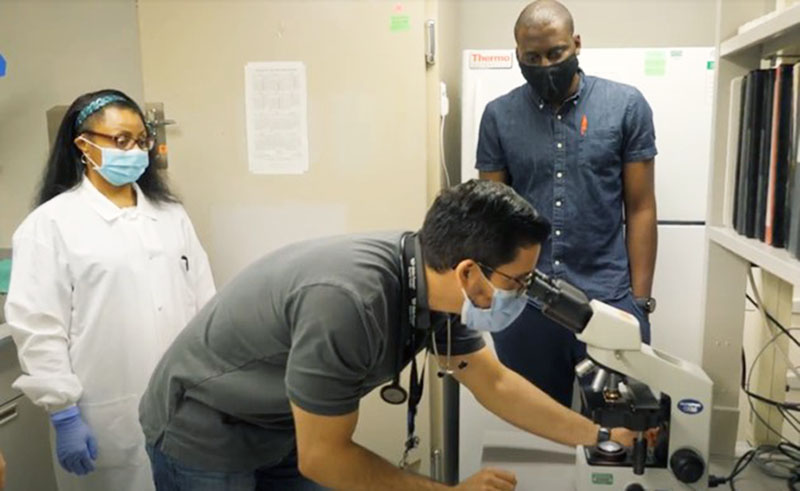Our tailored program ensures fellows receive comprehensive training in infectious diseases through robust educational, research and clinical learning experiences.
During the two years of fellowship training, fellows are trained in the breadth of infectious diseases through inpatient and outpatient clinical, academic and research activities.
Clinical Rotations
Most of our clinical training is offered at the Wake Forest Baptist Health Medical Center campus, which operates 1,004 acute care, rehabilitation and psychiatric care beds. Within the main hospital are general medicine nursing units, 33 intermediate care and 85 medical-surgical intensive care beds. Fellows care for patients in two inpatient consultative venues:
- ID Consult Service – A
- General infectious diseases inpatient consultations
- ID Consult Service – B
- Critical care and immunocompromised host infectious diseases inpatient consultations
Through these rotations, fellows encounter a broad variety of disease pathology. Within each venue, fellows are paired 1:1 with attending faculty for the rotation and are joined by internal medicine residents, medical students, and health professional students rotating through infectious diseases. Fellows spend approximately 20 weeks on the A and B ID Consult Services during their 1st year and 16 weeks during their 2nd year. Fellows do not participate in continuity clinic while on these rotations.
Fellows experience a broad array of infectious diseases training in the ambulatory setting during this rotation, which includes:
- Continuity Clinic
- Outpatient evaluation and management of patients with HIV and general infectious diseases
- Transplant ID Clinic
- Outpatient evaluation and management of patients who are preparing to undergo transplantation, or who experience an infectious disease post-transplantation
- HIV Medication Management Clinic
- Interprofessional clinic for patients with advanced antiretroviral medication considerations or those who are in need of other complex outpatient antimicrobial management
- Travel Clinic
- Evaluation, counseling, and management for persons who are preparing to travel and those who become ill upon return from travel
- STD/Public Health
- Ambulatory experiences at the Forsyth County Health Department provide fellows experience in the management of patients with communicable diseases at both the patient and community/county-level
A wide variety of elective rotations are available to provide fellows additional training in the depth and breadth of infectious diseases. Elective opportunities include rotations in:
- Antimicrobial stewardship
- Infection prevention and Hospital epidemiology
- Clinical microbiology
- Transplant infectious diseases
- Public Health
- OPAT
- Global Health and International rotations
- Medical education
- Critical care
- Addiction medicine
- Pediatric infectious disease
Specialty certificate programs
During their training, fellows can pursue certificate training in the following areas
- Antimicrobial stewardship
- Global Health
- Patient Safety and Quality
- Translation and Health System Sciences

Conferences and Didactics
During their training, fellows participate in a robust array of both faculty-led and fellow-led conferences spanning the breadth of topics in infectious diseases. The academic year starts off with a survival skills conference series. During the remainder of our academic year, fellows participate in the following conferences on a weekly basis:
- Infectious Diseases Grand Rounds
- Didactic conference
- Academic Half Day
- Internal Medicine Grand Rounds
- Journal Club, Research conference, M and M, or ID Board Review
- HIV conference series
- Micro rounds
Formal curricula in the following areas are built into the fellows’ conference series:
- Antimicrobial Stewardship
- Global Health
- Professional development (encompasses: career options, community ID practice models, physician contracts, compensation, billing and coding)
- Medical education
Training Sites
The primary training site is at Wake Forest Baptist Medical Center, a premier academic medical center that serves a four-state referral area. Fellows also rotate through the VA and local health departments. Clinical care activities provide fellows experience with the complete spectrum of pathology in our subspecialty. We enjoy collegial relationships with all our colleagues and collaborate with clinical microbiology and pharmacy to provide superior patient care and superb educational experiences for our trainees.
Additional training options
An additional year of training is available in research, critical care, or addiction medicine
 Research
Research
An NIH-funded training program (TL1) is offered through Wake Forest Clinical and Translational Science Institute and the Division of Public Health Sciences. Fellows have the option to pursue a certificate in Translational and Health System Science or Master of Science degree (M.S.) in Translational & Health System Science. A Hazzard Scholars Program is also available to support fellows during a third year to conduct research and to pursue a Master of Science degree (M.S.) in Clinical and Population Translational Sciences (CPTS) if desired. Both masters’ degree programs offer an emphasis in antibiotic stewardship and infection prevention.
Critical Care
Infectious Diseases fellows may pursue an additional year of subspecialty fellowship training in Critical Care Medicine upon completion of their 2-year core ID training. Fellows who are interested in this option can participate in a critical care elective during their first year of ID fellowship then apply to the critical care program early in their second year of ID fellowship.
Addiction Medicine
Infectious Diseases fellows may pursue an additional year of subspecialty fellowship training in Addiction Medicine upon completion of their 2-year core ID training. Fellows who are interested in this option can participate in an addiction medicine elective during their first year of ID fellowship then apply to the addiction medicine program early in their second year of ID fellowship.
